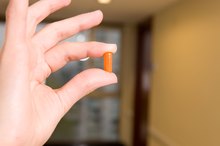What does fact checked mean?
At Healthfully, we strive to deliver objective content that is accurate and up-to-date. Our team periodically reviews articles in order to ensure content quality. The sources cited below consist of evidence from peer-reviewed journals, prominent medical organizations, academic associations, and government data.
The information contained on this site is for informational purposes only, and should not be used as a substitute for the advice of a professional health care provider. Please check with the appropriate physician regarding health questions and concerns. Although we strive to deliver accurate and up-to-date information, no guarantee to that effect is made.
What Is the Vitamin Deficiency That Causes Cheilosis?
If you are exhibiting cracks on the outside of your lips, you're likely experiencing cheliosis, a condition commonly caused by a deficiency of riboflavin, or vitamin B-2. A balanced diet can usually provide enough riboflavin to prevent cheliosis. A nutritionist can help you develop a nutritionally adequate meal plan, and your doctor can evaluate other possible causes of cheliosis, such as vitamin B-6 deficiency.
Functions and Deficiency
Riboflavin also supports antioxidant activity. Riboflavin deficiency is a risk factor for preeclampsia, or high blood pressure during pregnancy.
Requirements and Risk Factors
What Is the Difference Between B-12 & Methyl B-12?
Learn More
The recommended dietary allowance for riboflavin is 1.3 mg for adult men, 1.1 mg for adult women and 1.4 to 1.6 mg for pregnant or nursing women, according to the Institute of Medicine. Alcoholics are often at risk for deficiency because of an unbalanced diet and decreased absorption of riboflavin from food, according to the Linus Pauling Institute. Individuals with hypothyroidism and exceptionally physically active individuals, such as athletes, may have higher needs.
Food Sources
Other Information
Vitamins Necessary for Alcoholics
Learn More
The Institute of Medicine has not established an upper level of intake for riboflavin because there are no known cases of toxicity from riboflavin. If you have too much, you will likely experience flavinuria, or a bright yellow color in your urine, according to the Linus Pauling Institute. A riboflavin supplement, often as part of a multivitamin supplement, can help you meet your needs if you are not getting enough from your diet and you have cheliosis. Consult your doctor before taking a riboflavin supplement or any other dietary supplement.
- The Institute of Medicine has not established an upper level of intake for riboflavin because there are no known cases of toxicity from riboflavin.
- If you have too much, you will likely experience flavinuria, or a bright yellow color in your urine, according to the Linus Pauling Institute.
Related Articles
References
- Linus Pauling Institute Micronutrient Information Center; Riboflavin; Jane Higdon; September 2002
- U.S. Department of Health and Human Services; Dietary Guidelines for Americans, 2010; January 2010
- Medconditions.net: Vitamin B-6 Deficiency Definition
- National Institutes of Health. Riboflavin — Health Professional Fact Sheet. Updated March 6, 2020.
- Mcnulty H, Dowey LRC, Strain JJ, et al. Riboflavin Lowers Homocysteine in Individuals Homozygous for the MTHFR677C→T Polymorphism. Circulation. 2005;113(1):74-80. doi:10.1161/CIRCULATIONAHA.105.580332
- Riboflavin. In: Institute of Medicine (US) Standing Committee on the Scientific Evaluation of Dietary Reference Intakes and its Panel on Folate, Other B Vitamins, and Choline. Dietary Reference Intakes for Thiamin, Riboflavin, Niacin, Vitamin B6, Folate, Vitamin B12, Pantothenic Acid, Biotin, and Choline. Washington, DC: National Academies Press (US); 1998.
- Condo M, Posar A, Arbizzani A, Parmeggiani A. Riboflavin Prophylaxis in Pediatric and Adolescent Migraine. J Headache Pain. 2009;10(5):361-365. doi:10.1007/s10194-009-0142
- Powers HJ. Riboflavin (vitamin B-2) and health. Amer J Clin Nutr. 2003;77(6):1352-1360. doi:10.1093/ajcn/77.6.1352
- Weikel KA, Garber C, Baburins A, Taylor A. Nutritional modulation of cataract. Nutr Rev. 2014;72(1):30-47. doi:10.1111/nure.12077
- Kennedy DO. B Vitamins and the Brain: Mechanisms, Dose and Efficacy--A Review. Nutrients. 2016;8(2):68. doi:10.3390/nu8020068
Writer Bio
Natalie Stein specializes in weight loss and sports nutrition. She is based in Los Angeles and is an assistant professor with the Program for Public Health at Michigan State University. Stein holds a master of science degree in nutrition and a master of public health degree from Michigan State University.









